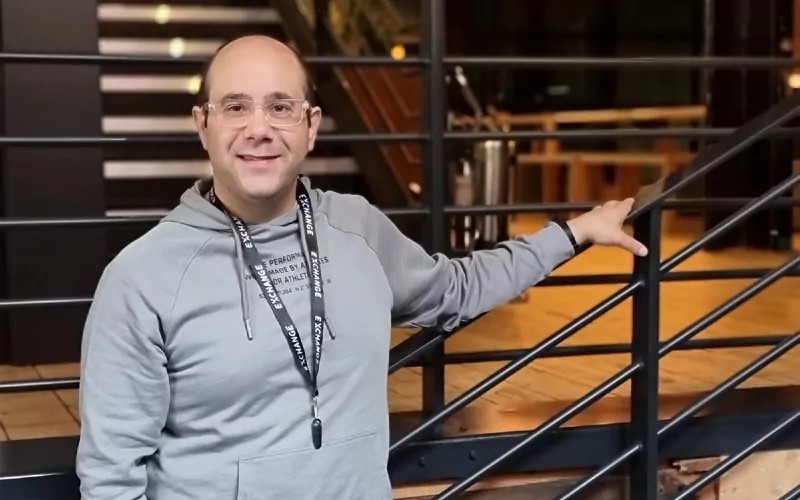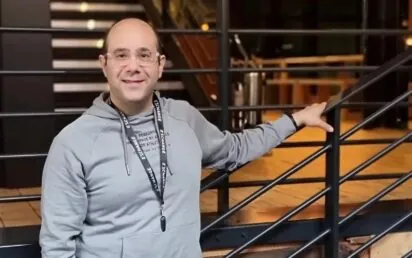When I first met David Levine in Manchester Science Park back in 2016, I was blown away by the augmented reality design tool he showed me.
Levine had founded DigitalBridge in 2013 after finding himself unable to choose between wallpaper samples for his home. By the time I visited, it was working alongside the likes of John Lewis to help people visualise how wallpaper, flooring and furniture might look in their own living room or bedroom.
Levine left DigitalBridge in May of last year but in the interim period built a global business focused on AI-guided design and employing around 40 people. He raised more than £3 million investment from angels and institutions.
“Fundraising is hard. It really is. Every founding team has four full-time jobs – selling, raising, hiring and running the business – which they have to do every day,” he tells TechBlast.
“Raising takes so much of your time – physically and emotionally.”
Now ‘entrepreneur in residence’ at Enterprise City’s Exchange support scheme for startups in the heart of Manchester – which is supported by Tech Nation – Levine is aiming to pass on his knowledge to the next generation of entrepreneurs.
“I try to shine a light on rabbit holes that they might fall down into, but not know about until two years down the line,” he explains.
“People need to be very, very protective of the investment they get early on. [In the past] I’ve seen people give away 50% of their business at the pre-seed stage; if they then give away 20-30% in the next round, by the time they get to Series A, they might be sub 10-15%.
“There are a lot of early stage investors in the North of England that have really low risk expectations in terms of the amount of money they want to put into ventures and the type of valuation that they place on it, which I think is really constraining.
“When you get institutional investors in down the line, if so much dilution has happened early on then they’ll feel the founders don’t have enough of a share of the business to keep them going through the really hard days as they won’t do well enough on any type of exit.
“That is what really sophisticated typically Series A and Series B investors will look at: what does the cap table look like?”
He adds: “If you try to raise for the entire lifecycle of the business before you have proven yourself and gained traction in the market, you will have to accept an extremely low valuation.
“Aim for 12-18 months of runway and figure out where you want to be in 18 months’ time. The only thing that really matters is to clearly articulate how much you are raising; what you’re going to do with that raise; and where you will be when you have spent that money.”
Levine, a former Vodafone global head of connected car who also spent seven years working at the office of the CTO at Hewlett-Packard, says UK startups suffer from a lack of ambition compared with their counterparts in the US.
“People here are excited to project £5 million, £7m a year. That’s not big enough,” he says. “I spent a lot of time in the US over the years fundraising and the one thing investors in the US will say is ‘stop thinking British – stop thinking conservative’.
“They’ll tell you that the only difference between you and somebody from the US walking through their door is the US entrepreneurs are promising to build a $100m business.
“They might have sat across from a kid in Starbucks on University Avenue in Palo Alto who told them they were going to build a billion-dollar business – then seen the kid do just that. So you’ve got a lot of FOMO (fear of missing out) there.”
Levine says as there are more US funds based in London than the regions, this problem is less acute in the capital.
He advises that it is better to raise money from VCs – people who typically understand technology and how to build an early stage business, having done it themselves – rather than from private equity, which is more focused on returns for the investor than the success of the business.
“That is really constraining our ability to be successful in the region,” he says. “However, we’re very lucky to have the likes of GP Bullhound, an investor which understands how to support startup entrepreneurs.”
Levine adds: “Every VC or PE investor will take a meeting, even if they already know they’re not investing for two years – because they want advance sight of deals. It’s naughty because a startup’s most precious commodity is time.
“You come away thinking you’ve had a great meeting, but they’re not going to invest as you don’t meet their criteria for two years. I think there should be a lot more openness about that.”


